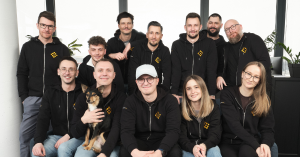• Ukrainian AI startup OSavul secured $1 million in a seed round led by SMRK venture fund.
• Created as a response to the Rusian invasion of Ukraine, the startup specializes in information security, countering disinformation, and information environment assessment.
• The funding will be used to incorporate Large Language Models to enhance information environment analysis capabilities and further develop its platform.
The Ukrainian startup was founded in March 2022 by Ukrainian entrepreneurs Dmytro Pleshakov and Dmytro Bilash, after Russia invaded Ukraine.
“We use AI to analyze both content and behavior signals and identify malicious activities such as disinformation campaigns or influence operations. We take into account various factors like temporal patterns of activity, accounts coordination, promoted narratives, etc,” Pleshakov and Bilash tell The Recursive in a statement.
The two founders have significant experience in the field of IT development and artificial intelligence. With the start of a Russian full-scale invasion, they applied their skills to find a gap in disinformation analysis and countering and started cooperating with government agencies as volunteers.
“The first challenge is the scale of information operations. In the last 6 months, Ukraine experienced more than 250 disinformation attacks. Russia seeds the information on different platforms, and websites, in closed online communities. Considering such a scale, it is challenging to identify threats before they become too big. We employ AI to solve issues on a scale. Also, worth noting is the high level of sophistication of disinfo campaigns, involving different platforms: both public (Twitter, media) and private (communities in Telegram), different languages, and different tactics,” the two co-founders explain.
“OSavul is founded by an exceptional team with a deep understanding of AI technology from both engineering and business perspectives. We are honored to take part in their new endeavor,” explains Vlad Tislenko, partner at SMRK VC, a Ukrainian fund that focuses on Seed to Series B stages to startups that have a clear connection to Ukraine and a high potential for economic, social, and environmental impact.
The startup currently offers three products: CommSecure, a software platform for information environment assessment, identification, and analysis of narratives, as well as information threats in the media environment; CIB Guard, a module for analyzing coordinated inauthentic behavior between accounts in media, messengers, and social networks; and InfoOps, an integrated service when the company both provides software and performs the tasks of analytics and countering disinformation.
Using the platform, security, and communications professionals working with the public sector and the political sphere, business, non-profit organizations, security agencies, and the PR sphere can discover the necessary information, measure and find countermeasures if they pose a threat.
Aiding NATO and Ukraine relations
OSavul’s tools have already countered several cases of disinformation coming from Russia. In November 2022, OSavul discovered a campaign aimed at discrediting the Armed Forces of Ukraine, the Ministry of Health of Ukraine, and NATO countries.
The message that was spread on social media said that “NATO countries have been supplying Ukraine with canned blood infected with HIV, hepatitis B & C, and other infections that could lead to an epidemic among Ukrainian military personnel”.
“The publications were accompanied by documents that allegedly bore the signature of the Minister of Health of Ukraine and were allegedly obtained with the help of the Kombatant hacker group. The task of the OSavul was to detect the threat as early as possible and have it analyzed by security experts to make the right decision to counter the threat. In fact, the whole thing was and is a fake from the start – NATO has never provided blood donations. First and foremost, the campaign was aimed at discrediting NATO in Ukraine, trying to create distrust between Ukrainians and NATO partners, and trying to intimidate people inside the country,” Pleshakov and Bilash recall the story.
According to them, the particular case was dangerous because it was intended to have a two-way impact: on military and humanitarian issues within the country, as well as an external impact in terms of geopolitical issues and cooperation with Ukraine’s allies.
As a result, the Ukrainian Ministry of Health refuted the information – and the quick response helped to prevent the potential threat and impact of the campaign on the public at the initial stages, Bilash and Pleshakov emphasize.
As the new geopolitical reality settles, during the past year tech startups across the region and wider have been providing many solutions that include the use of AI, drones, and cybersecurity, as the war and defense tech industry is gathering pace.








